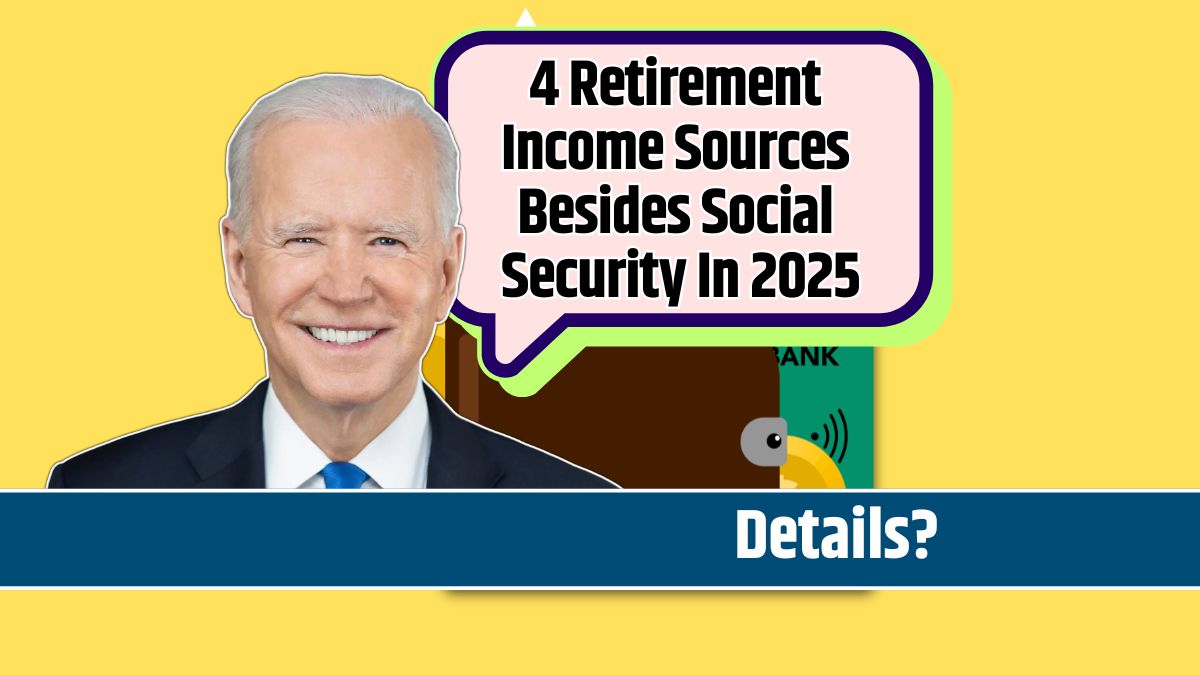With the 2025 Social Security cost-of-living adjustment (COLA) around the corner, retirees may feel some financial relief.
However, the expected 2.5% increase, adding about $48 to the average monthly benefit, is unlikely to cover all rising expenses, especially with inflation lingering.
So, what can you do if your Social Security benefits fall short? Here are four other retirement income sources to consider in 2025.
Savings
Your personal savings are one of the most flexible and readily accessible sources of retirement income.
Whether it’s money saved in a high-yield savings account, a Roth IRA, or a 401(k), these funds allow you to withdraw as needed to cover unexpected expenses or supplement your Social Security income.
However, it’s crucial to have a sound withdrawal strategy. A common approach is the 4% rule, which suggests withdrawing 4% of your savings annually to make your nest egg last through your retirement years. This is especially important since you don’t want to run out of funds early in retirement.
Also, be strategic about which accounts you draw from. Withdrawing from tax-deferred accounts like 401(k)s and traditional IRAs could trigger taxes, while Roth accounts typically allow for tax-free withdrawals.
If you’re 73 or older, remember to factor in required minimum distributions (RMDs) from tax-deferred accounts to avoid hefty penalties.
For maximum security, diversify where you keep your savings. Consider putting part of it in low-risk, easily accessible options like certificates of deposit (CDs) or savings accounts, while keeping some funds invested in stocks and bonds to ensure continued growth.
Employment
If you’re in good health and enjoy staying active, working part-time can be a valuable income stream.
Whether it’s continuing in your pre-retirement career or taking on a different role that interests you, earning income from work is a great way to make ends meet while also staying socially engaged.
You could even explore remote work, which offers the flexibility to travel and still earn an income.
For those considering entrepreneurship in retirement, starting a small business can be an exciting opportunity.
But be cautious, as the financial risks could outweigh the benefits. Start-ups often require significant capital, and there’s always the possibility of failure. Make sure you carefully weigh the pros and cons before embarking on a new business venture.
Rental Income
For retirees who own additional properties, rental income can provide a stable, ongoing source of revenue.
Whether you own a second home, vacation property, or a multi-family building, renting it out can supplement your Social Security checks.
Long-term rentals provide steady, predictable income, while short-term vacation rentals could generate higher income if you’re in a tourist hotspot.
Keep in mind that rental properties come with responsibilities. You’ll need to handle maintenance, repairs, and potentially difficult tenants. If you prefer to keep things hands-off, hiring a property manager can alleviate the stress, although this will cut into your profits.
Short-term rentals, like Airbnb, also offer flexibility. However, they often require more attention between guests. You may need to hire cleaners or inspectors regularly to ensure your property remains in top shape.
Government Assistance
While Social Security is a federal program, there are additional government assistance programs designed to help retirees meet their basic needs.
These include food, housing, and utility assistance. Most programs are administered at the state or local level, and eligibility requirements vary based on income.
If you find yourself unable to cover your living expenses, programs like Supplemental Nutrition Assistance Program (SNAP) for food assistance, Medicaid for healthcare, and Low Income Home Energy Assistance Program (LIHEAP) for utility bills may be available to you.
Be aware that most government programs require proof of income, and you may have to periodically recertify your financial situation to remain eligible.
Balancing Multiple Income Sources
Many retirees will need to rely on a combination of these income sources to maintain their lifestyle in retirement. Creating a detailed budget is essential for staying on top of your financial situation.
After factoring in your Social Security benefits, review all your additional income streams—whether it’s rental income, part-time employment, or withdrawals from your savings.
If, after a few months, you find your budget isn’t working, consider adjusting your spending or looking for additional ways to bring in more income. The goal is to find a balance that allows you to live comfortably without depleting your savings too quickly.
By planning ahead and diversifying your income streams, you can reduce the financial stress of retirement, even if Social Security alone doesn’t cover all your expenses.
FAQs
What is the 4% rule for retirement savings withdrawals?
It suggests withdrawing 4% of your savings annually for long-term sustainability.
Can you still work after claiming Social Security benefits?
Yes, you can work part-time or full-time, although earnings may affect your benefits.
Is rental income taxable in retirement?
Yes, rental income is subject to federal income taxes, and possibly state taxes too.
What government programs help retirees besides Social Security?
Programs like Medicaid, SNAP, and LIHEAP provide additional assistance for healthcare, food, and utilities.
How do RMDs affect retirement accounts?
You must take required minimum distributions from tax-deferred accounts after age 73 or face penalties.



















